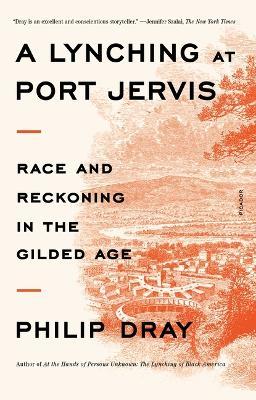A Lynching at Port Jervis: Race and Reckoning in the Gilded Age

A Lynching at Port Jervis: Race and Reckoning in the Gilded Age
An account of a lynching that took place in New York in 1892, forcing the North to reckon with its own racism.
On June 2, 1892, in the small, idyllic village of Port Jervis, New York, a young Black man named Robert Lewis was lynched by a violent mob. The twenty-eight-year-old victim had been accused of sexually assaulting Lena McMahon, the daughter of one of the town's well-liked Irish American families. The incident was infamous at once, for it was seen as a portent that lynching, a Southern scourge, surging uncontrollably below the Mason-Dixon Line, was about to extend its tendrils north. What factors prompted such a spasm of racial violence in a relatively prosperous, industrious upstate New York town, attracting the scrutiny of the Black journalist Ida B. Wells, just then beginning her courageous anti-lynching crusade? What meaning did the country assign to it? And of what did the incident forewarn? Today, it's a terrible truth that the assault on the lives of Black Americans is neither a regional nor a temporary issue, but a national crisis. Black people are regularly killed by police, and the term "Jim Crow" has found new purpose in describing the harsh conditions of life for the formerly incarcerated, as well as the large-scale efforts to make voting inaccessible to Black people and other minority citizens. That what drove the 2021 attack on the U.S. Capitol was a "mobocratic spirit"--a phrase Abraham Lincoln used as early as 1838 to describe vigilantism's corrosive effect on America--frightfully insinuates that mob violence is a viable means of effecting political change. These issues remain as deserving of our concern now as they did 130 years ago, when America turned its gaze to Port Jervis. An alleged crime, a lynching, a misbegotten attempt at an official inquiry, and a past unresolved--in A Lynching at Port Jervis, the acclaimed historian Philip Dray revisits this time and place to consider its significance in our communal history and to show how justice cannot be achieved without an honest reckoning.PRP: 111.60 Lei
Acesta este Prețul Recomandat de Producător. Prețul de vânzare al produsului este afișat mai jos.
100.44Lei
100.44Lei
111.60 LeiLivrare in 2-4 saptamani
Descrierea produsului
An account of a lynching that took place in New York in 1892, forcing the North to reckon with its own racism.
On June 2, 1892, in the small, idyllic village of Port Jervis, New York, a young Black man named Robert Lewis was lynched by a violent mob. The twenty-eight-year-old victim had been accused of sexually assaulting Lena McMahon, the daughter of one of the town's well-liked Irish American families. The incident was infamous at once, for it was seen as a portent that lynching, a Southern scourge, surging uncontrollably below the Mason-Dixon Line, was about to extend its tendrils north. What factors prompted such a spasm of racial violence in a relatively prosperous, industrious upstate New York town, attracting the scrutiny of the Black journalist Ida B. Wells, just then beginning her courageous anti-lynching crusade? What meaning did the country assign to it? And of what did the incident forewarn? Today, it's a terrible truth that the assault on the lives of Black Americans is neither a regional nor a temporary issue, but a national crisis. Black people are regularly killed by police, and the term "Jim Crow" has found new purpose in describing the harsh conditions of life for the formerly incarcerated, as well as the large-scale efforts to make voting inaccessible to Black people and other minority citizens. That what drove the 2021 attack on the U.S. Capitol was a "mobocratic spirit"--a phrase Abraham Lincoln used as early as 1838 to describe vigilantism's corrosive effect on America--frightfully insinuates that mob violence is a viable means of effecting political change. These issues remain as deserving of our concern now as they did 130 years ago, when America turned its gaze to Port Jervis. An alleged crime, a lynching, a misbegotten attempt at an official inquiry, and a past unresolved--in A Lynching at Port Jervis, the acclaimed historian Philip Dray revisits this time and place to consider its significance in our communal history and to show how justice cannot be achieved without an honest reckoning.Detaliile produsului










